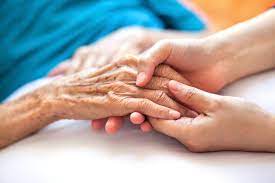
“There are only four kinds of people in the world. Those who have been caregivers. Those who are currently caregivers. Those who will be caregivers, and those who will need caregivers” Rosalyn Carter
A society of care dedicates resources to support vulnerable groups such as children, those with disabilities or living in poverty, and our elders or seniors. By 2030 one in every 5 people in the US will be 65 or older. Aging can be a positive, constructive, and dynamic time of life. Accompanying aging is an increased risk for acute, chronic, or degenerative illness that can affect mind and body, thereby requiring medical, social, psychological, and/or caregiving services.
Primary caregivers are often family members. A conservative estimate is over 17 million individuals are family caregivers for someone 65 or over. As our older population increases, there will be a subsequent need for more family caregivers. Many caregivers are seniors themselves. Approximately 20% of adults 65 and older are caretakers for family or friends. Being a caretaker can be a deeply valued role, where one can express dedication, compassion, and love. Nonetheless there is risk of developing caregiver fatigue or burnout, a consequence of chronic stress without adequate rest and restoration.
High levels of ongoing stress can have serious consequences for our health. Caregiver stress and fatigue reflects a state of emotional, physical and mental exhaustion. For example, 37% of caregivers report getting insufficient sleep. Caregivers may struggle with loneliness, depletion, financial strain, frustration, guilt, and anxiety, suppressed emotions, and/or depression while coping with loss of choices and future plans. Researchers have found that spousal caregivers may be more likely to experience depression than their partner.
Aloneness and isolation are common: A caregiver states: “I have wonderful friends, but most people can’t do chronic well. They have their lives, and mine is at a standstill. I feel betwixt and between, like in suspended animation. This is a lonely place”.
Also, there is loss, grief, and distress that accompanies seeing a loved one struggle, losing aspects of their mental and physical functions. A type of grief known as Ambiguous Grief reflects a loss of the fullness, companionship, or vitality of the other, while they are here with us. A caregiver stated: “What I miss daily is who he was, my companion. I even miss our arguments!”
Many clients express decision making conflicts: “I want her at home, yet I fear I cannot provide or afford sufficient care”. There may be guilt: "I feel terribly conflicted spending time on me". Such emotions and thoughts expressed are all completely normal.
There is a societal myth of the perfect caregiver, which embodies unrealistic expectations. If we absorb such expectations we will fall short, which adds to guilt. Even striving to do our best,
being a caregiver presents complicated daily challenges and often scarcity of available services. It takes a community to care for our seniors. Family caregivers are an essential cornerstone of our society providing crucial and unpaid service. Healthier caregivers are those that take care of themselves. In our efforts to address another's suffering, we tend to deny our own.
Caregivers – what you provide is meaning and challenging! If you are frequently worried, sad, anxious or fearful, overwhelmed and tired, are easily irritated or angry, experiencing bodily pain, headaches or illness, or have lost interest in activities, you may be experiencing caregiver fatigue. Your self-care is essential and a priority.
Suggestions for caregivers: Develop connections, join a Caregiver Support Group, talk to a counselor or trusted person, and spend time with friends. Accept help and be realistic about what you can provide. Nourish yourself with healthy foods, stay active, and take daily breaks. Focus on other important aspects of your life such as medical and self-care appointments. Get respite care. Focus where you have choice, take in the positive experiences, and learn self-compassion.
Do not be a cargiver alone. Explore services from many local, statewide, and national resources, such as: Senior Solutions - Council on Aging for SE VT (www.seniorsolutionsvt.org), National Alliance for CareGivers (www.caregiving.org), AARP Public Policy Institute (www.aarp.org), and the Family Caregiver Alliance (www.cargiver.org).
By Jilisa Snyder, Ph.D – Dr. Jilisa Snyder, is the Clinical Director of The Anna Marsh Clinic, a community outpatient psychotherapy and psychiatric program of the Brattleboro Retreat.
